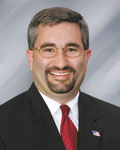December 6, 2010
Top Tax Planning Tips
 By Curt Ford
By Curt Ford
Nash Nash Bean & Ford
While April 15th may still be a long way off, the end of the year is prime time to start making the important decisions that will affect next year’s income tax return. Here are some suggestions that might help make that check you write in April a little smaller:
• Pay attention to your recordkeeping. Keeping good records is essential to minimizing your tax bill. Being organized and keeping track of your expenses throughout the year will not only help reduce the stress of filing your taxes, it will help ensure you don’t miss a potential deduction. Plus, if the unthinkable happens and you’re chosen for an audit, you won’t have to scramble to substantiate your expenses or charitable contributions.
• Be aware of mutual fund distribution dates. If you own mutual funds, make sure you know what the distribution date for each fund is. This is the date on which the fund distributes its gains and losses. You only have taxable income from the fund if you own the fund on its distribution date. So, if you’re considering selling a mutual fund, doing so before its distribution date can save you some taxable income. Likewise, waiting to invest in a mutual fund until after its distribution date can reduce your tax bill.
• Consider the timing of income and expenses. Expecting to be in a lower tax bracket next year? If you can control your income and expenses, you can make this situation work to your advantage, tax-wise. If you can push back some of your income into next year, or incur a portion of next year’s expenses this year instead, you can minimize your income tax bill. This can be as simple as anticipating what supplies you’ll need for first quarter next year, and purchasing them by December 31st; or paying an upcoming tax or professional licensure bill in December instead of January.
• Fund your retirement accounts. If you have a traditional IRA or 401(k), then contributions to those accounts are made with before-tax dollars. And, you have until April 15th to make a contribution and have it apply to the previous calendar year’s tax bill. If you’re considering converting your traditional IRA to a Roth, the deadline for doing so is December 31st of the tax year in question.
• Avoid penalties by taking your required minimum distributions. If you’ve reached age 70_, and you have a retirement account, like a 401(k) or traditional IRA, then you’re likely subject to the rules requiring you to take minimum distributions from your retirement account each year. Make sure you take your complete distribution – failure to do this will result in a 50% penalty!
• Give to charity. If you’re considering making a contribution to your favorite charity, it’s usually best to do so before the end of the year, so that you can claim the deduction on this year’s tax return. The exception to this rule is if you anticipate moving into a higher tax bracket next year. If this is the case, you may want to wait to make your charitable contribution until after the first of the year, when you’ll need the tax savings more.
• Use your flexible spending account. If you have a balance in your flexible spending account, you know that the end of the year is your deadline to either use it or lose it. So, now is the time to schedule any medical procedures you’ve been putting off, take that trip to the dentist, or make time for an eye exam.
• Get help if you need it. When considering all of these tips, it’s important to remember that there are numerous rules, limits, and exceptions that also apply. There are deduction floors for medical expenses and the like, there’s the alternative minimum tax, there’s the impact of state taxes – and those are just a few considerations. It can never hurt to get the assistance of a tax professional to make sure you’ve considered all the possibilities.
We all want to pay only our fair share of taxes. The best way to do this is to plan carefully throughout the year, arrange your business and personal transactions to maximize your tax savings, and get help when you need it.
Nash Nash Bean & Ford are members of the American Academy of Estate Planning Attorneys and the National Academy of Elder Law Attorneys. To receive a copy of our most recent newsletter “Your Estate Matters” or for a free consultation on Estate or Long Term Care Planning, call 309-944-2188, 309-762-9368 or 1-800-644-5345. You may also contact our firm by email at info@nashbeanford.com or visit our web site at http://www.nashbeanford.com.
The firm devotes its practice primarily in the areas of estate, business and tax planning and related areas of the law, as well as elder law and trust administration and probate. We offer guidance and advice to our clients in every area of estate planning.
This column is designed for general information purposes only, and is not intended, nor should be construed or relied upon, as legal advice. Please consult your attorney if specific legal information is desired.
Curt Bean is an attorney at Nash Nash Bean & Ford. He can be reached at 309-944-2188 or 309-762-9368 or at info@nashbeanford.com
Filed Under: Finance
Tags: 401 K, Amp, Charitable Contributions, Fund Distribution, Important Decisions, Income Tax Bill, Income Tax Return, Ira Contributions, Losses, Mutual Fund, Mutual Funds, Nash, Pay Attention, Prime Time, Recordkeeping, Retirement Accounts, Tax Bracket, Tax Planning, Taxable Income, Traditional Ira, Unthinkable
Trackback URL: https://www.50pluslife.com/2010/12/06/top-tax-planning-tips/trackback/


